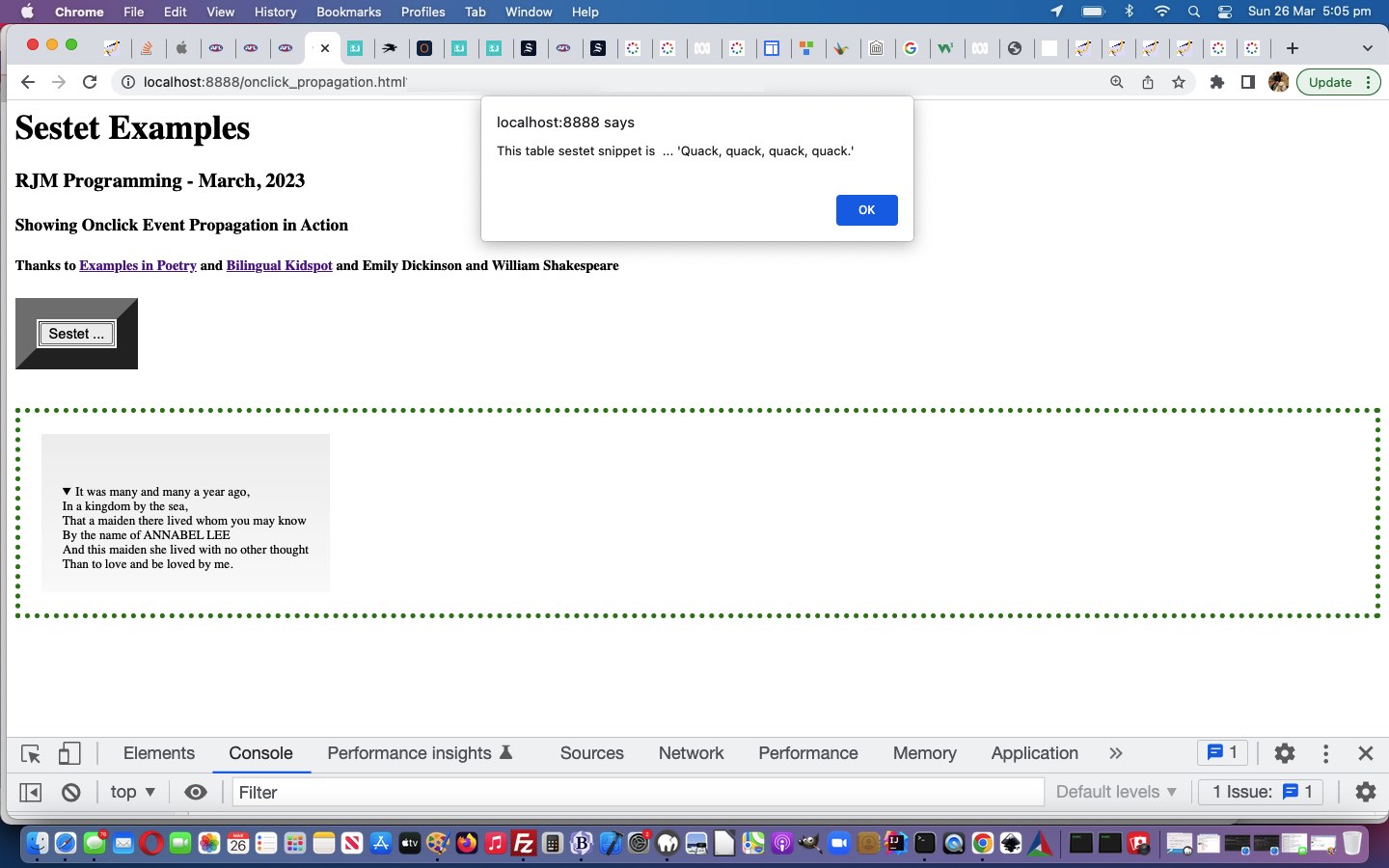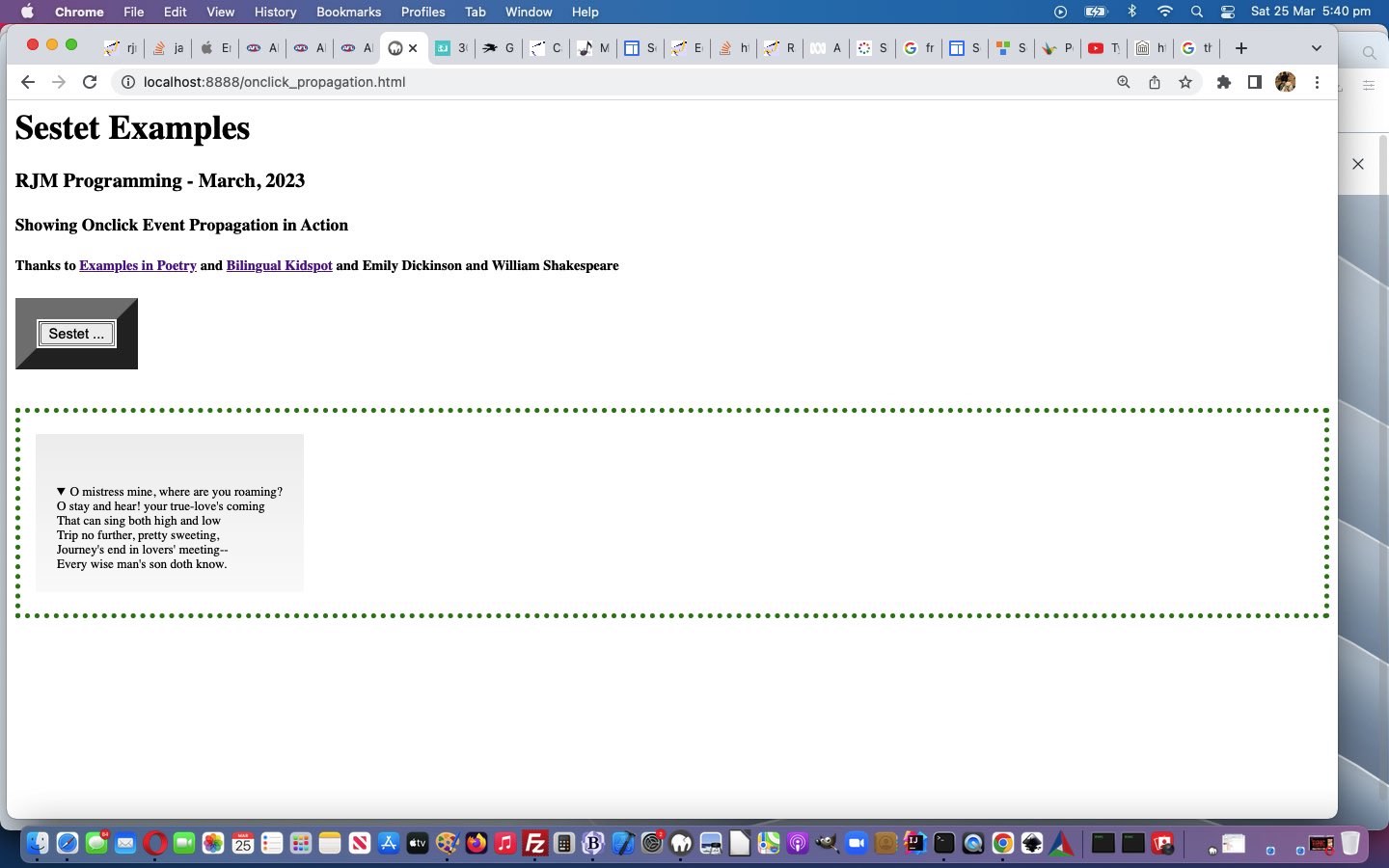Yesterday’s Onclick Event Propagation Primer Tutorial approach to harnessing the “powers of propagation” was a bit “scattergun”. We never referenced the very useful …
… global variable that can be used in Javascript event logic to get the element where the event originated, as distinct from function moi‘s “othis” argument, which points at the HTML webpage element calling the “onclick” event logic.
Its use can add nuance to the reworked “onclick” event sharing Javascript function …
function moi(othis) {
var extras='';
//document.getElementById('myh1').innerHTML+=' ' + event.target.outerHTML.substring(1).split(' ')[0].split('>')[0];
if (('' + event.target.outerHTML).substring(1).split(' ')[0].split('>')[0] != 'button') {
if (eval('' + jdc) >= eval('' + lotsofsix.length)) { jdc=0; }
//alert('2967 ' + othis.outerHTML.substring(1).split(' ')[0].split('>')[0]);
if ((',' + cindxs + ',').indexOf(',' + othis.outerHTML.substring(1).split(' ')[0].split('>')[0] + ':') != -1) {
//alert((',' + cindxs + ',').split(',' + othis.outerHTML.substring(1).split(' ')[0].split('>')[0] + ':')[1].split(',')[0] + ' ' + jdc + ' ' + lotsofsix[jdc]);
jdc=Math.floor(Math.random() * lotsofsix.length);
alert('This ' + othis.outerHTML.substring(1).split(' ')[0].split('>')[0] + ' sestet snippet is ... ' + lotsofsix[jdc].split(';')[eval((',' + cindxs + ',').split(',' + othis.outerHTML.substring(1).split(' ')[0].split('>')[0] + ':')[1].split(',')[0])].replace(/\<br\>/g, String.fromCharCode(10)));
}
} else if (othis.outerHTML.substring(1).split(' ')[0].split('>')[0] == 'details' || (othis.outerHTML.substring(1).split(' ')[0].split('>')[0] == 'body' && blurbsuffix == '') || noway) {
//alert(1967);
noway=true;
if (othis.outerHTML.substring(1).split(' ')[0].split('>')[0] == 'body') { noway=false; }
} else {
//alert(blurbsuffix + ' ... ' + othis.outerHTML.substring(1).split(' ')[0].split('>')[0]);
if (('' + othis.id) != '') { extras=' ID=' + othis.id; idfound=true; } else {
if (eval('' + jdc) >= eval('' + lotsofsix.length)) { jdc=0; }
if (eval('' + detnum) > 0) {
if (lotsofsix[jdc].split(';')[idc].indexOf('<br>') != -1) {
if (document.getElementById('det' + eval(-1 + detnum))) {
document.getElementById('det' + eval(-1 + detnum)).open=false;
}
}
}
blurb+='<br>' + lotsofsix[jdc].split(';')[idc].replace('<br>', '<br><details onclick="noway=false;" id=det' + detnum + ' open><summary>') + detsuffix; detsuffix='';
}
detsuffix='';
if (othis.outerHTML.substring(1).split(' ')[0].split('>')[0] == 'body' && !idfound) {
var suf=tableize(blurb.replace('</summary><br>', '</summary>') + blurbsuffix);
if (suf != '') { document.getElementById('results').innerHTML+=suf; }
//alert(document.getElementById('results').innerHTML);
detsuffix='';
blurbsuffix='';
detnum++;
} else if (idfound) {
detsuffix='';
blurbsuffix='';
document.getElementById('results').innerHTML+=othis.outerHTML.substring(1).split(' ')[0].split('>')[0] + extras + ' clicked.<br>';
} else if (('' + event.target.outerHTML).substring(1).split(' ')[0].split('>')[0] != 'button') {
//alert(967);
if ((',' + cindxs + ',').indexOf(',' + othis.outerHTML.substring(1).split(' ')[0].split('>')[0] + ':') != -1) {
jdc=Math.floor(Math.random() * lotsofsix.length);
alert('This ' + othis.outerHTML.substring(1).split(' ')[0].split('>')[0] + ' sestet snippet is ... ' + lotsofsix[jdc].split(';')[eval((',' + cindxs + ',').split(',' + othis.outerHTML.substring(1).split(' ')[0].split('>')[0] + ':')[1].split(',')[0])].replace(/\<br\>/g, String.fromCharCode(10)));
}
}
jdc++;
}
}
… in the changed “proof of concept” onclick_propagation.html Sestet web application you can also try below.
Previous relevant Onclick Event Propagation Primer Tutorial is shown below.
A basis for web application event driven programming strategies references …
- element nesting and inheritance …
- the default event propagation up through the element hierarchy
Of course you can ignore how this event “bubbling” can be harnessed, and indeed, we normally do not harness this event programming abilities in webpages, but not today! Today, we want to harness, via “onclick” event (sharing a common …
function moi(othis) {
var extras='';
if (othis.outerHTML.substring(1).split(' ')[0].split('>')[0] == 'details' || (othis.outerHTML.substring(1).split(' ')[0].split('>')[0] == 'body' && blurbsuffix == '') || noway) {
noway=true;
if (othis.outerHTML.substring(1).split(' ')[0].split('>')[0] == 'body') { noway=false; }
} else {
//alert(blurbsuffix + ' ... ' + othis.outerHTML.substring(1).split(' ')[0].split('>')[0]);
if (('' + othis.id) != '') { extras=' ID=' + othis.id; idfound=true; } else {
if (eval('' + jdc) >= eval('' + lotsofsix.length)) { jdc=0; }
if (eval('' + detnum) > 0) {
if (lotsofsix[jdc].split(';')[idc].indexOf('<br>') != -1) {
if (document.getElementById('det' + eval(-1 + detnum))) {
document.getElementById('det' + eval(-1 + detnum)).open=false;
}
}
}
blurb+='<br>' + lotsofsix[jdc].split(';')[idc].replace('<br>', '<br><details onclick="noway=false;" id=det' + detnum + ' open><summary>') + detsuffix; detsuffix='';
}
detsuffix='';
if (othis.outerHTML.substring(1).split(' ')[0].split('>')[0] == 'body' && !idfound) {
var suf=tableize(blurb.replace('</summary><br>', '</summary>') + blurbsuffix);
if (suf != '') { document.getElementById('results').innerHTML+=suf; }
//alert(document.getElementById('results').innerHTML);
detsuffix='';
blurbsuffix='';
detnum++;
} else if (idfound) {
detsuffix='';
blurbsuffix='';
document.getElementById('results').innerHTML+=othis.outerHTML.substring(1).split(' ')[0].split('>')[0] + extras + ' clicked.<br>';
}
jdc++;
}
}
… event “onclick” logic Javascript function, as above) propagation, the sharing of piecing together the content display of …
Sestet poems and rhymes
… where the six lines of poetry are written out by the “onclick” events of …
- button
- td
- tr
- tbody
- table
- body
… in hierarchical order in the “proof of concept” onclick_propagation.html Sestet web application you can also try below …
If this was interesting you may be interested in this too.
If this was interesting you may be interested in this too.




